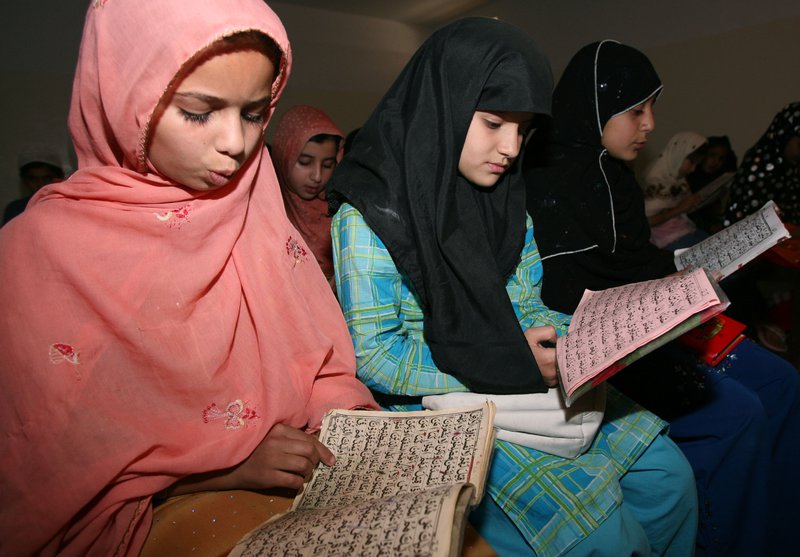Muhammad Samiullah was arrested on January 28, 2011 and charged under section 295-C of Pakistan’s penal code. One of his professors at the intermediate level education board had complained that the boy had written derogatory remarks against the Prophet Muhammad in a school exam in April 2010, an offence punishable with the death penalty.
The last couple of years have propelled Pakistan into the center stage of the ‘war on terror’, especially as a point of convergence for the Taliban, al-Qaida, and associated tribal militants. Hence it is becoming increasingly clear that any sustainable and viable solution to the threat of global terrorism has to incorporate Pakistan. But the roots of terrorism in the region cannot be found in the battlefields. Rather, the Taliban came into existence in Pakistani madrassas, religious seminaries. Hence the struggle to eliminate terrorists remains a Sisyphean struggle as long as there are institutions that ensure a steady stream of radicals as replacements. It is therefore essential to understand the processes behind the constant flow of Islamist terrorists.
The madrassa curriculum often consists of teaching students to memorize the Koran as well as learning Arabic. The madrassa usually offers free boarding and lodging to the students, but does not equip its graduates with any skills that prepare them for a regular job in the economy. Possessing only rudimentary religious education, the madrassa graduate is a soft target for fundamentalist recruiters, especially against the background of persistent unemployment and poverty.

Demotix/M Gilani. School children in Pakistan. All rights reserved.
The assassination of the Governor of Punjab, Salmaan Taseer on January 3, 2010 by one of his security guards is a manifestation of the radicalization of the Pakistani society. Salmaan Taseer was the only prominent Pakistani politician opposed to the blasphemy law. The assailant reportedly gave a statement immediately after his arrest expressing no remorse as he was ostensibly "protecting Allah's religion." The assailant sought to imitate “Ghazi Illam Din,” a Muslim who shot dead a Hindu publisher for publishing an allegedly blasphemous book about the Prophet Muhammad. Illam Din is eulogized and celebrated by the Pakistani public, media and - more significantly - the schools’ history curricula.
But the roots of the problem extend beyond the madrassas alone; regular schools are also breeding grounds for militancy. During the Soviet invasion of Afghanistan, the military dictator in charge of Pakistan, General Zia-ul-Haq designed and implemented a social engineering effort directed towards radicalization of the Pakistani society in the 1980s. The constitution was undemocratically amended to make it conform to the Sharia. The Islamization of the school curricula was the cornerstone of this social engineering attempt. Islamiat (Islamic studies) was made a mandatory subject, which it remains until today.
Additionally, Islamic and Pakistan studies is a compulsory subject in the Central Superior Service exam, a remnant of the colonial era designed for the selection of civil servants. The objective of the exam is to select the crème de la crème of the society and prepare them for top jobs in government and public administration. The inclusion of Islamic studies as a mandatory subject indicates that the architects of the curriculum did not envisage non-Muslim civil servants. A recurring question in the exam in recent years has been a variant of, “under what circumstances is suicide bombing Islamic?” Bear in mind that this is a question that future defense and foreign secretaries of Pakistan are made to answer.
The world has realized the causal link between madrassas and Islamic fundamentalism, yet the response signifies a superficial understanding of the relationship. The madrassas are considered to be deliberately molding young people to become religious extremists of the future. This view overlooks the systemic intolerance that has been created in the Pakistani society in general and in the education system in particular, both in the madrassa and non-madrassa system.
The global war against Islamic fundamentalism cannot be won without a moderate and secular Pakistan. A larger portion of the foreign aid assigned to Pakistan should be non-military. The international community is in a position right now to demand changes from Pakistan, it should insist on the country’s leadership to reform the education system towards a more liberal and tolerant curriculum. Otherwise terrorist organizations in the region will retain their fertile breeding grounds and experience no shortage in potential recruits.
Read more
Get our weekly email
Comments
We encourage anyone to comment, please consult the oD commenting guidelines if you have any questions.